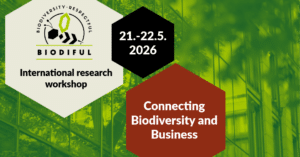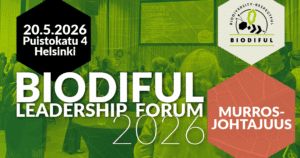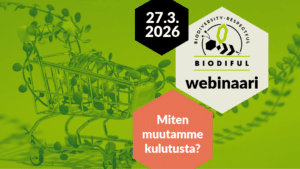Last week, the BIODIFUL research team was well-represented at Finland’s biggest sustainability research event, Science for Sustainability 2025. The three-day conference, from September 30th to October 2nd in Helsinki, brought together multidisciplinary experts under the thought-provoking theme bursting the sustainability bubble. This collaborative effort between two universities, the University of Helsinki and Aalto University, aimed to challenge sustainability myths and break down barriers between disciplines and industries.
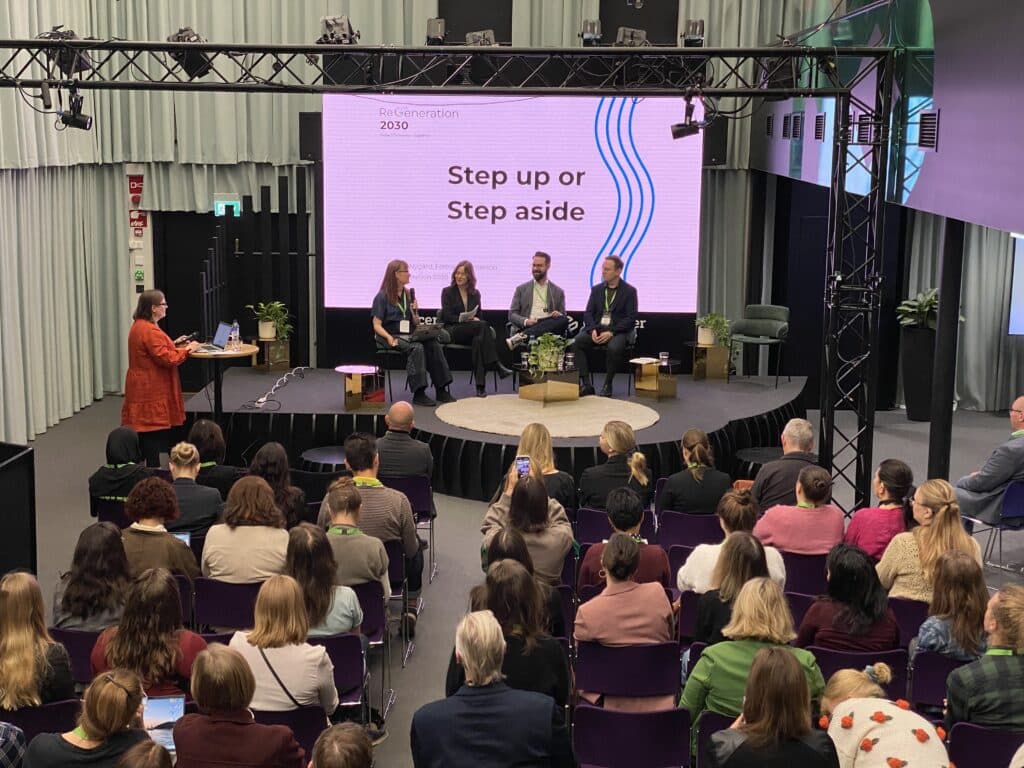
Wednesday: Measuring the planetary crisis or solving it?
The conference kicked off with a plenary about resilient systems featuring Emilia Nygård, Paavo Järvensivu and Matti Pihlajamaa. The plenary was followed by session ”Towards Biodiversity-Respectful Futures” chaired by our own Marileena Mäkelä from the University of Jyväskylä. The session explored a critical question: How can we pursue human wellbeing while respecting biodiversity and planetary boundaries?
”While our session featured a lot of biodiversity measurement approaches, and though we certainly still need to develop metrics, what we need most is action”, reflects Marileena. ”In many ways, we already have substantial knowledge about what causes biodiversity loss, such as the five drivers identified by IPBES. Tiina Onkila raised an important question at the end of our session: what will actually motivate us to take practical action?”
Wednesday afternoon brought a thought-provoking session on ”Rethinking Consumption in the Age of Degrowth” where several BIODIFUL researchers presented their work. Session chair Juulia Räikkönen (University of Turku) set the stage by addressing the uncomfortable reality that household consumption remains a key driver of ecological crisis.
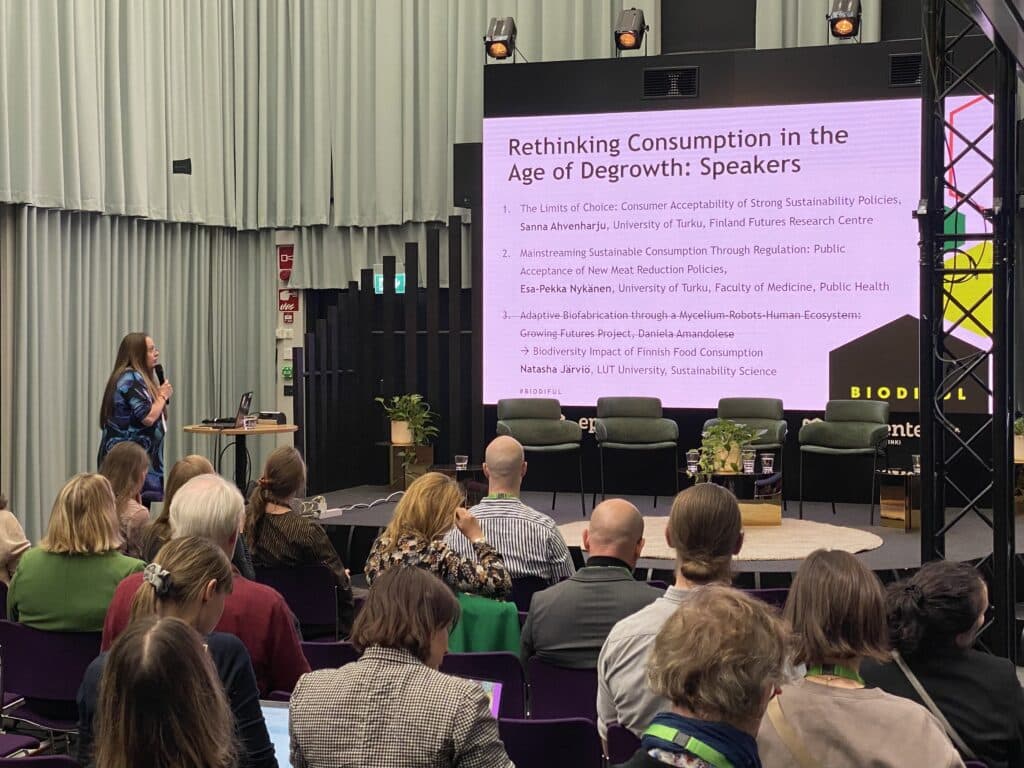
Sanna Ahvenharju (Finland Futures Research Centre, UTU) challenged attendees with her presentation on ”The Limits of Choice: Consumer Acceptability of Strong Sustainability Policies” and the example of tobacco regulation a few decades ago. Esa-Pekka Nykänen (University of Turku) followed with insights on public acceptance of meat reduction policies, while Natasha Järviö (LUT) presented eye-opening research on the biodiversity impact of Finnish food consumption patterns.
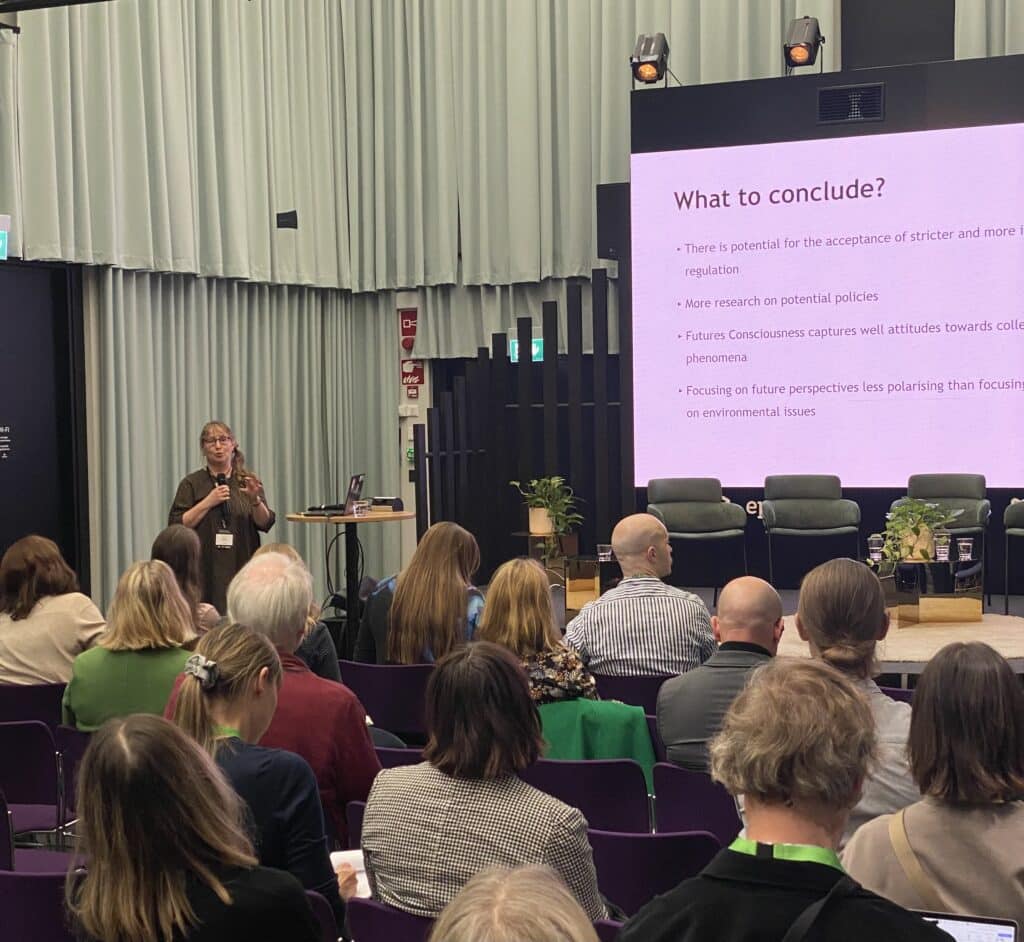
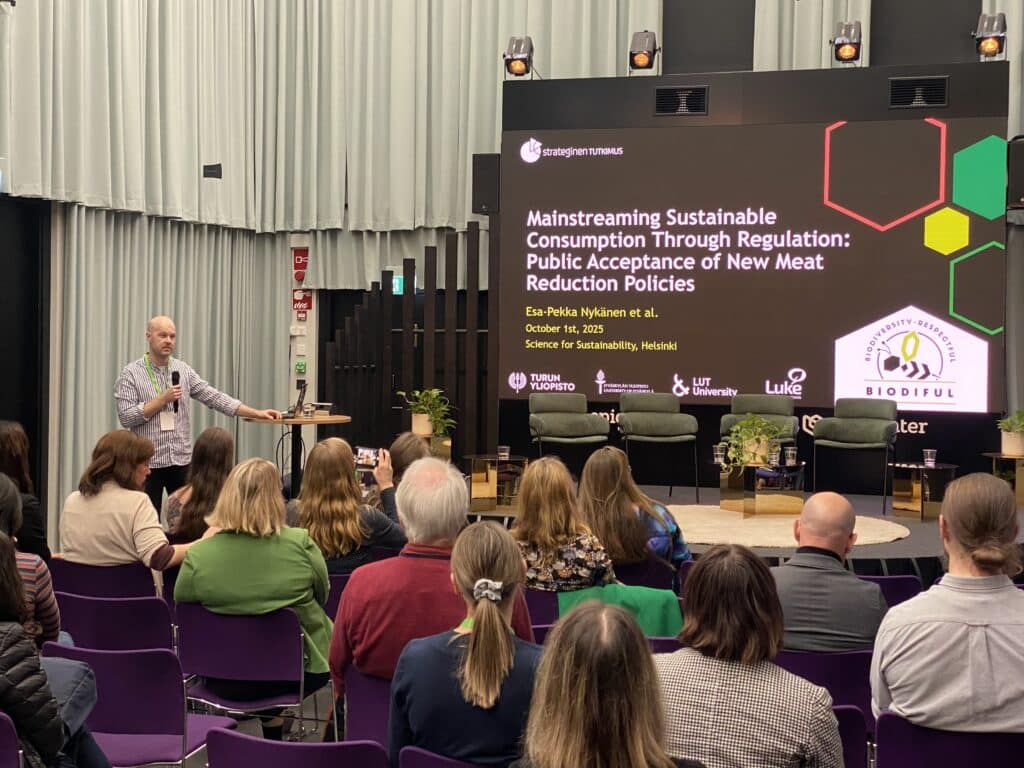
Thursday: Can research meet reality?
Thursday began with two parallel sessions featuring BIODIFUL researchers. In the main lounge, Satu Teerikangas (University of Turku) chaired a session on ”Sustainability Agency” exploring the actors and dynamics driving sustainable change. Irene Kuhmonen (University of Jyväskylä) and Tuomas Kuhmonen (University of Turku) presented their work on ”A Morphogenetic Approach on Agency and Structure in Sustainability Transitions”, examining the complex interplay between individual actions and systemic structures. ”It was inspiring to realise that there are so many different actor types that are making a difference”, noted one participant. Reflecting on the session, Satu adds, ”These are times that challenge us to consider the human condition. For me, elements supportive of sustainability agency relate to maintaining inner peace and pursuing a meaningful life path.”
Meanwhile, upstairs, Milla Unkila (University of Turku) led one of the most thought-provoking sessions of the conference: ”Bursting the Bubble for Real – The Civilization Will Collapse”. This bold roundtable featured BIODIFUL researchers Milla Unkila, Saska Tuomasjukka, Outi Uusitalo, Sanna Ahvenharju, and Aino Tarkkio addressing the taboo topic of civilization collapse.
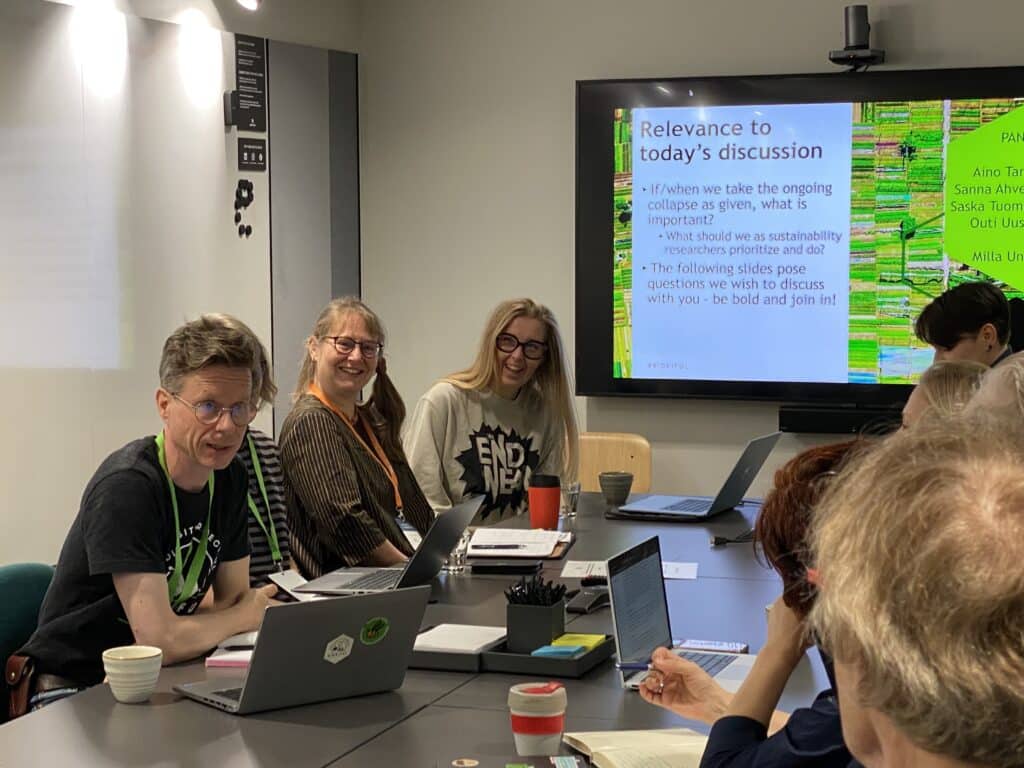
Rather than presenting a message of doom, the panel reframed the conversation around how sustainability researchers can meaningfully contribute by mitigating collapse impacts, increasing adaptability, and laying foundations for future civilizations. The interactive format drew robust participation, with audience members sharing their own reflections on the role of sustainability research in uncertain times.
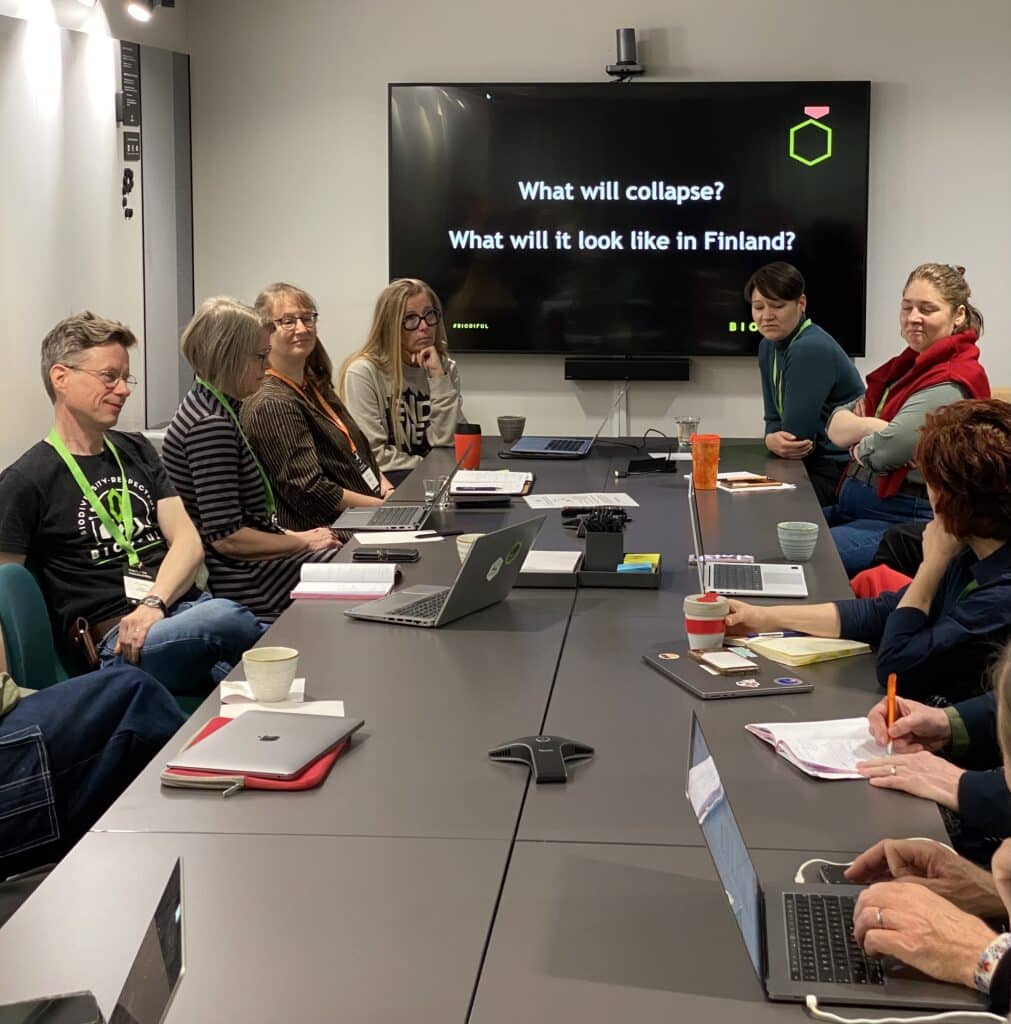
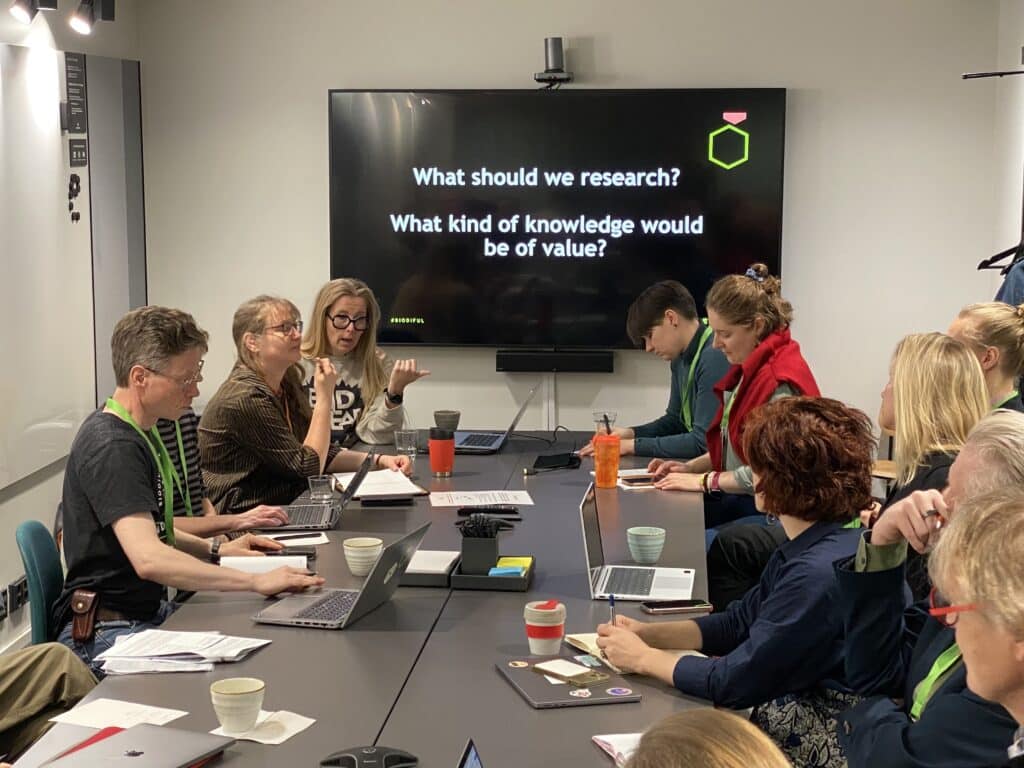
Saska Tuomasjukka shares one of his key takeaways: ”I was touched by the talks with Michiru Nagatsu over the lunch. Hope is a concept, that we should find not utilitarian, not seeking a happy end, but as a means for ”us to become reclaiming activists in our work”, as he writes in his inaugural speech. Like little children getting bored of the game, we should ask ourselves: What shall we play next?”
Beyond BIODIFULers
In addition to our wonderful own researchers, we heard interesting sessions by other experts as well. For instance, Heidi Lehtiniemi from University of Helsinki chaired a thought-provoking session on ”Fostering imagination and pluralism in biodiversity conservation”. The presentations explored how experts’ own perceptions shape biodiversity assessments, the alignment between EU policies and scientific findings from IPCC and IPBES, and offered fascinating insider insights into global biodiversity negotiations.
Johanna Ahola’s session on hope and optimism challenged conventional thinking in a surprising way. Rather than simply celebrating hope as a virtue, speakers explored how certain types of hope can actually be harmful by distracting us from present action. The discussions highlighted hope’s equivocal nature as neither inherently good nor bad, but potentially dangerous when it calms us into contentment or waiting for future solutions instead of acting now.
Another highlight was Pauliina Damdimopoulou from Karolinska Institute, who delivered an alarming yet necessary talk on chemicals, plastics, and fertility. Her presentation reminded us to consider the triple planetary crisis holistically, including pollution alongside climate change and biodiversity loss. Particularly eye-opening was her point that human-made mass (plastics, buildings, infrastructure) exceeds biomass on Earth. It means that plastics outweigh all animals, while our built environment outweighs all trees and shrubs. These perspectives added crucial dimensions to discussions about planetary boundaries and future resilience.
Now is the time for action
Throughout the conference, BIODIFUL researchers demonstrated how interdisciplinary collaboration can lead to more nuanced understandings of sustainability challenges. Outi Uusitalo summed up what many felt at the conference: ”The atmosphere clearly showed a hunger for concrete action. We have plenty of knowledge and discussions; these problems have been known for a long time, so now it’s time to act. I don’t think anyone wants to be in the same situation 10 years from now, with nothing having changed…” The message from the conference and our researchers was straightforward: to tackle our planetary crisis, we need creative partnerships and honest conversations about the challenges, but most urgently we need decisive action.
